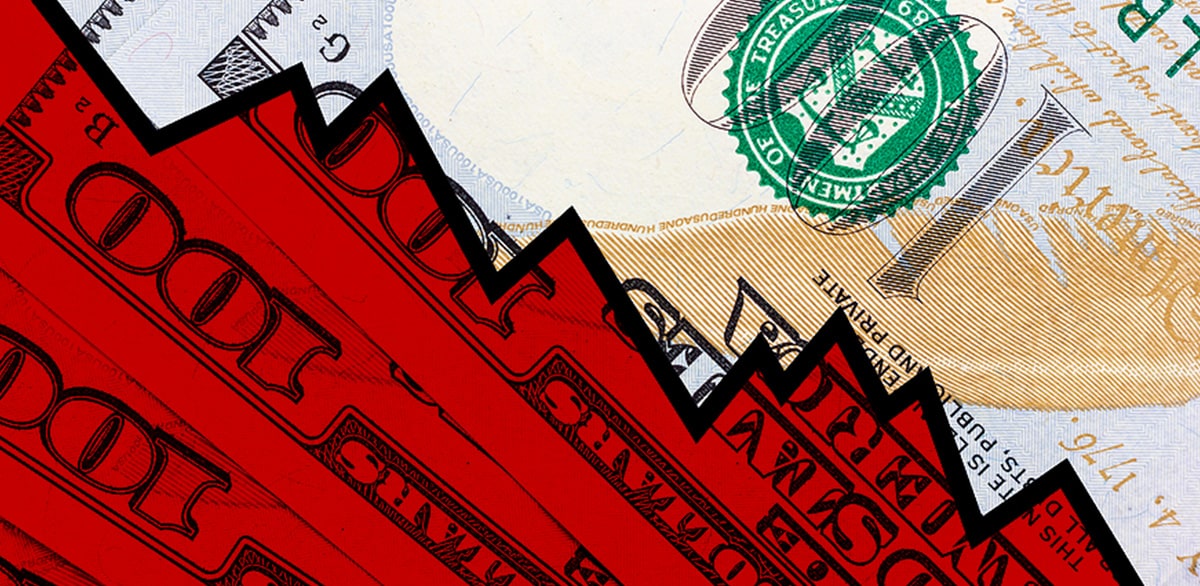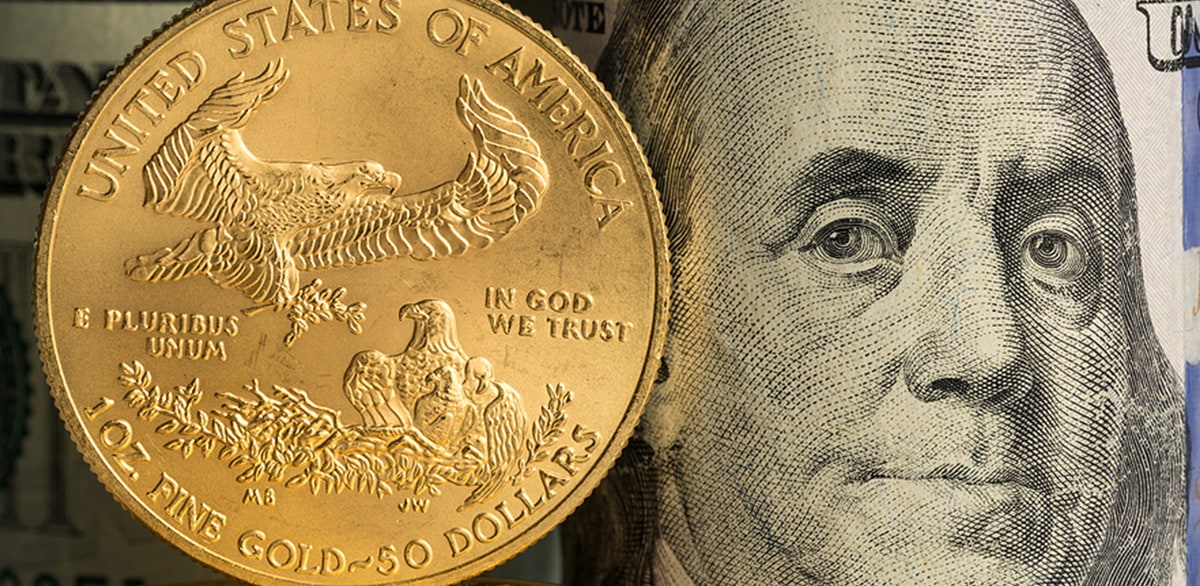
With record-setting inflation, a domestic banking crisis, and the rapid acceleration of de-dollarization, it’s no wonder investors are concerned about the strength of the US dollar. Conventional investing wisdom mistakenly assumes the dollar will remain in a dominant position forever. The global shift away from the dollar is proving otherwise. Understanding what to own when the dollar collapses can ensure your wealth is protected no matter what the economic storm churns up.
The Weakness of Paper-Backed Assets
Traditional investment strategies usually focus entirely on paper-backed assets. The routine suggestion from retirement planners is 60% stocks and 40% bonds. While these assets can yield decent returns when the dollar is strong, the slightest bit of economic uncertainty is enough to send prices spiraling.
We’ve seen this play out during the recent banking crisis, amidst soaring inflation, and following ceaseless pandemic spending. A staggering $3 trillion has been erased from retirement savings over the past few years alone. Investors have the economic battle scars to prove that paper assets tend to significantly decrease in value when the dollar is weak.
Are Foreign Assets Safe?
In the broad discussion of what to own with the trend toward a dollar collapse, some people suggest investing in emerging and foreign markets. The thought process is that burgeoning economies such as India, Brazil, and China will benefit from a weak greenback. The same logic is applied to investing in foreign currencies that might receive a boost as the dollar buckles.

Everything you need to know to get started in Precious Metals
Learn how precious metals can strengthen your portfolio, protect your assets and leverage inflation.
This logic might seem reasonable at first, but there’s a glaring issue. The dollar isn’t just the strongest currency on the block. It’s also the sole foundation propping up the entire global economy. Once that footing is removed, every economy will suffer until a new structure is built. The only real safe haven is physical assets with no connection to paper money.
Where to Invest Before the Dollar Collapses

Precious Metals
For centuries, physical precious metals have been a reliable hedge against inflation. Prices tend to rise as fiat-backed assets lose value which makes them perfect candidates for a possible dollar collapse. In fact, the dollar has lost 99% of its value compared to gold over the past 100 years. There are a variety of physical metal products including investment-grade coins, bars, and rounds, making it easy for investors to find a strategy that meets their unique goals and budget.
Precious Metals IRA
If you’re searching for diversification to protect against a dollar collapse, you might also be wondering how to incorporate physical assets into your retirement savings. Unfortunately, mainstream plans such as 401(k)s, Roth IRAs, and traditional IRAs limit you to paper assets. That’s where a precious metals IRA comes into play. This unique retirement plan opens you up to owning physical metals while giving you the tax advantages of standard accounts.
Real Estate
The real estate market is a powerhouse in the US economy, making up anywhere between 15 and 18% of the country’s total GDP. The value of real estate tends to perform well during periods of inflation as increased costs slow down new construction. Everyone needs a place to live and every business needs a place to operate no matter how the dollar performs. The combination of limited supply and strong demand guarantees value over time. However, there is a considerably high barrier to entry when it comes to owning real estate.
Collectibles
The idea of “collecting as investing” has been around for centuries, but the trend has seen a huge surge over the past few years as economic pressures mount. The idea is simple: buy popular items within an active market that’s independent of the traditional economy. Investors put their money into a wide variety of collectibles including:
- Art
- Classic cars
- Sports memorabilia
- Antiques
- Wine
- Comic books
Unconventional? Yes! Then again, conventional assets don’t always get the job done. Still, collectibles remain a niche investment primarily due to the scale of the markets which can decrease liquidity.
Land
Land is a finite resource with inherent value which makes it another popular option for investors weary of the dollar’s increasing vulnerability. It’s not tied to traditional markets which shields it from turbulence and uncertainty. No matter what’s going on in the economy, land is needed for agriculture, development, and resource excavation. Similar to real estate, it’s generally more expensive to invest in land when compared to other hard assets.
What About Cryptocurrency?
Cryptocurrencies are often touted as digital gold with the promise of offering protection against economic turbulence. Over the past few years, crypto markets have actually grown to mirror traditional markets. In the face of an imminent dollar collapse, even the strongest crypto supporters are changing their tune.
Many are ditching Bitcoin in favor of gold which has a proven track record of rising in value as traditional markets struggle. Plus, there’s no telling what kind of restrictive regulation the government will roll out in the future that could reset crypto’s value.
Could the Government Confiscate Gold if the Dollar Collapses?
People aren’t just wondering what to own when the dollar collapses, they’re also asking if it could lead the government to confiscate gold…again. Anyone familiar with Executive Order 6102 knows the possibility isn’t as unrealistic as it might sound.
In 1933, Franklin D. Roosevelt passed the Gold Confiscation Act in an attempt to stabilize the economy in the throes of the Great Depression. Americans were forced under threat of prosecution to give up their gold so the Federal Reserve could boost their supplies to print more money (back when the US was still on the gold standard).
Nobody can predict the future with certainty, but the government already established a precedent of confiscating gold from the citizenry when they deemed it necessary. The likelihood of that recent history repeating only increases if the dollar collapses and the economy worsens.
Is the Dollar in Danger of Collapse?
Yes, the US dollar is in danger of collapsing. The process of de-dollarization is in full swing as countries around the world seek to distance their economies from the US dollar. The world is losing confidence in the greenback due to the banking crisis, exorbitant spending, mounting debt, and rising inflation. At this point, the question is a matter of timing, not possibility.
What if everything fails? People used to buy gold more or less as a hedge. Now people are more concerned about absolute dollar failure.–Eric Sepanek, Scottsdale Bullion & Coin Precious Metals Advisor
Don’t Wait to Diversify
You shouldn’t wait until the dollar tanks to reconsider your investing strategy. There’s a good chance your current investment structure is reliant on a strong dollar. The best way to hedge against the dollar collapse is to diversify now.
If you’re interested in learning more about the benefits of precious metals, request our FREE gold and silver Investment guide.


